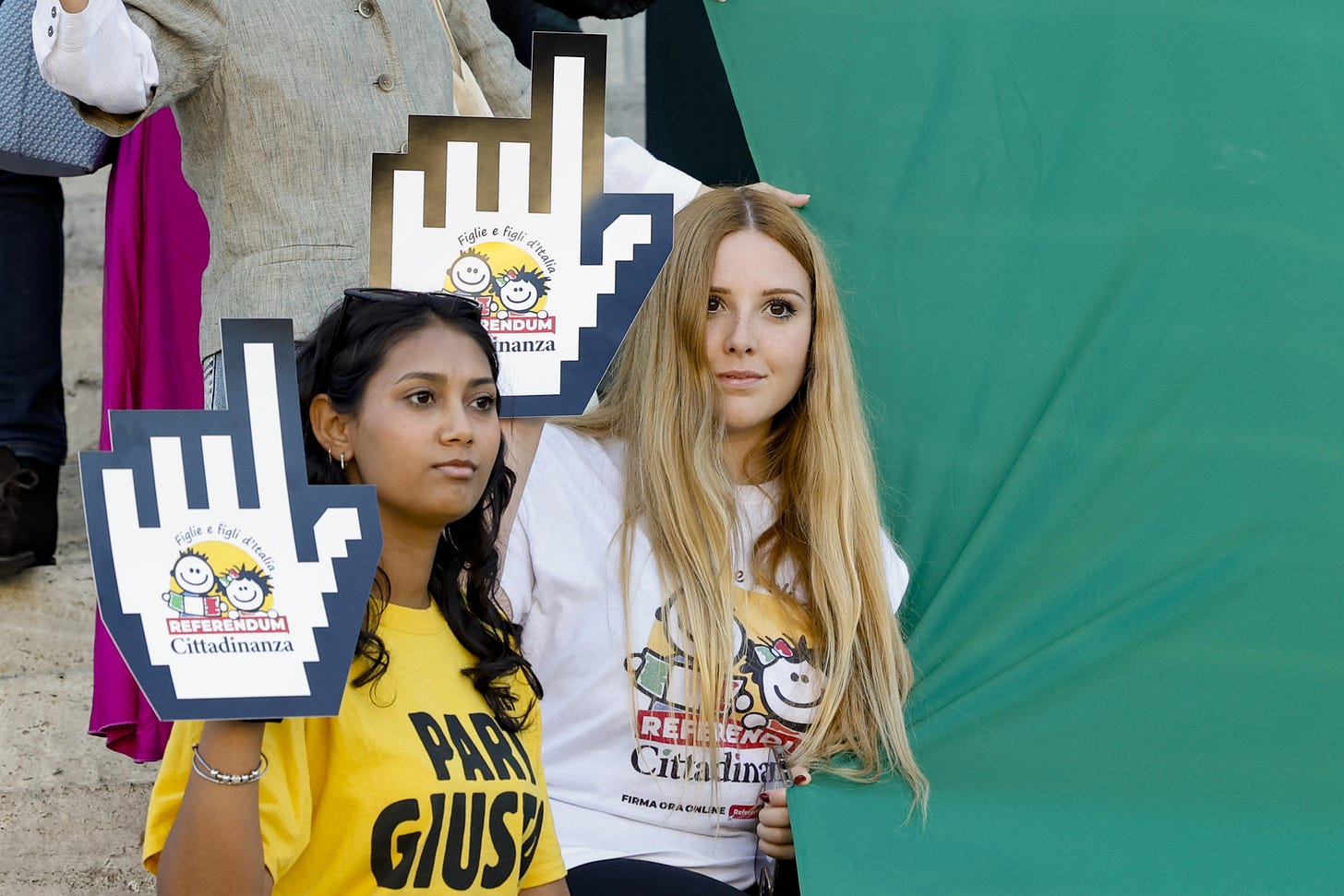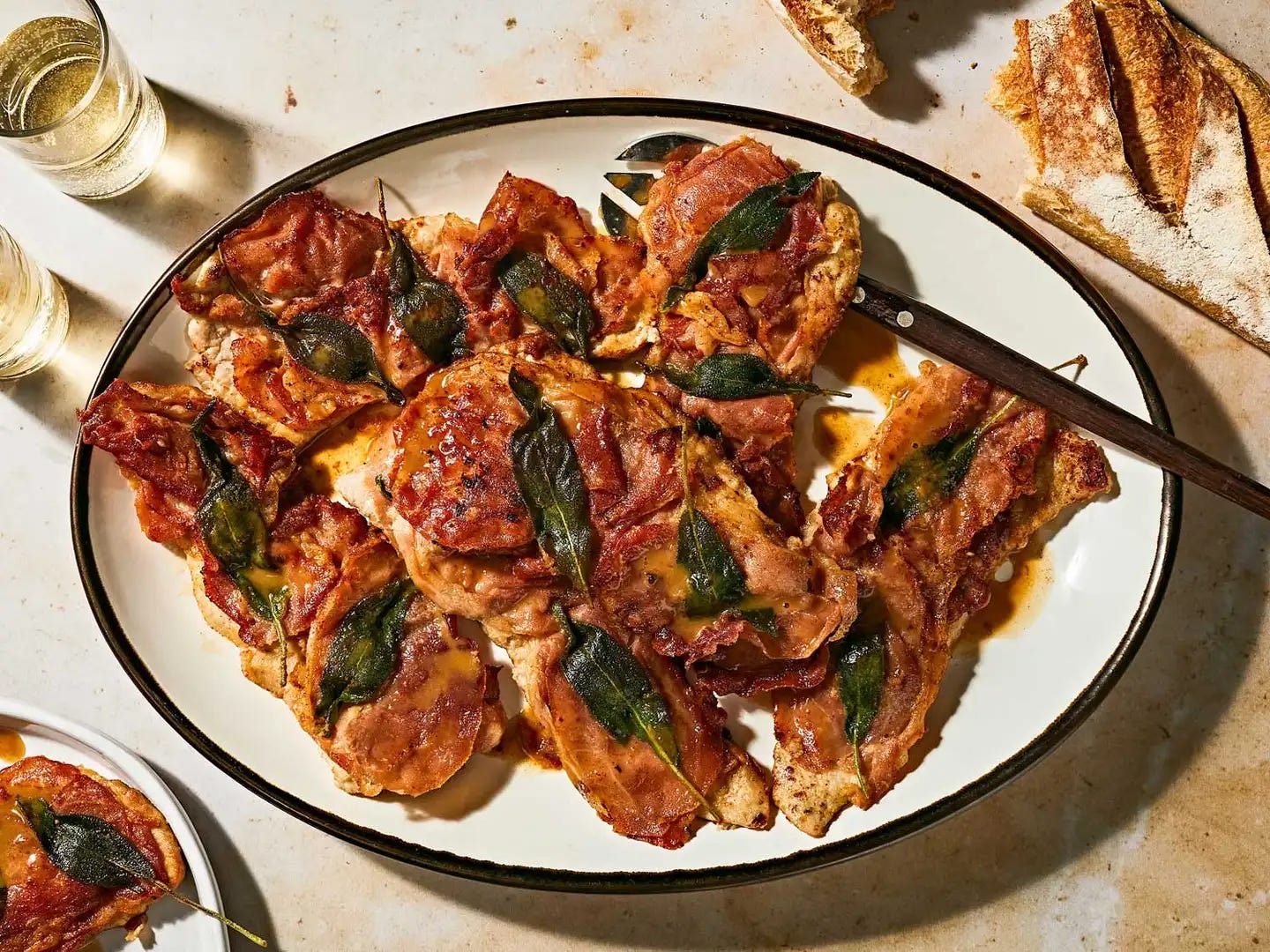Referendum Watch (part 1)
Plus, Umberto Contarello’s debut film and new fiction by Domenico Starnone
In just over two weeks, Italians will be called-up to vote in five simultaneous referendums on workers’ rights and citizenship reform, the results of which could have major consequences for all of us living here. If you need a refresher on what exactly is at stake, ‘Wanted in Rome’ has written an excellent summary of the main points here, and I recommend being clued up because this is shaping up to be the most significant political contest of the year so far. Think I’m exaggerating? Just look at how adamantly the government is trying to obstruct the vote. This week Giorgia Meloni’s party Fratelli d’Italia published an internal memo with the title “choose abstention” which orders members to discourage friends and family from participating in the referendum; Antonio Tajani has also told Forza Italia supporters not to vote, while Matteo Salvini says he will “be heading to the beach that day.” This is typically undignified behaviour on the part of elected representatives, but, on the plus side, it also reveals there is, genuinely, space for democrats to regain some power. As Filippo Miraglia (ARCI) recently put it, “to reach quorum, we have to unite the fight for workers’ rights together with the right to citizenship. Human rights, civil rights and social rights have been under attack for many years, and this is an opportunity for the left to regain the upper hand.” Miraglia’s words are inspiring, but I’m afraid, at the time of writing, it does look like an uphill struggle. According to the latest surveys, just 54% of Italians consider themselves sufficiently well-informed to vote, and the anticipated turnout is a mere 34%, well below the figure required for a valid result. For obvious reasons, I’ll be dedicating a good chunk of this newsletter to the referendum(s) over the next fortnight. So watch this space, and whatever your view on the issues at hand, help get the word out if you can.

But onto the specifics. The citizenship referendum (i.e. referendum 5) comes at a funny time for Italy. In fact, it’s pretty extraordinary the vote is happening at all really. Since the Berlusconi years, consecutive Italian governments have been tightening restrictions on applications, and the wind in parliament is still heading in that direction. Just this week, Meloni’s administration made it trickier to achieve naturalization by descent by passing a law that will prevent applicants from getting Italian citizenship through their great-grandparents. The reason, they said, was to avoid “the abuse of the system.” All of which makes this referendum both untimely and politically hefty. The choice is simple. If Italians vote yes, they will half the time of legal residence required for non-EU adult foreigners to request citizenship (from 10 to 5 years). Just like that. Such a result would help an anticipated 1.4 million would-be Italians who are stuck in limbo; including teenagers who have lived here all their lives without representation and rights. It would also help people in ambiguous situations who are caught in bureaucratic red tape, and bring Italy in line with other European countries like the UK and Germany. I’ll be making my own personal and entirely subjective argument for YES closer to the referendum date, but in the meantime, I recommend following this coverage by ANSA/InfoMigrants for the latest developments.
Next up, some travel news. As I’m sure you’re aware, Stanley Tucci is back with another of his “eating his way around Italy shows”, and the marketing is inescapable. ‘Tucci in Italy’ is essentially a sequel to the actor’s last series ‘Searching for Italy’ which aired on CNN in 2021/22 before being cancelled. In this new NatGeo format, Tucci travels about, talks with some generally well-informed fixers, poses in linen suits, offers some cool but simultaneously arrogant soundbites, all topped off with some well-meaning but hardly groundbreaking political analysis. I caught the first Tuscan-themed episode over the weekend, and my verdict? It’s ok! I was pleased to see Tucci’s Florence picks included Sergio Pollini Lampredotto (the best in town), and Lola; both brilliant of course. His trip to Lunigiana and Siena also yielded some good footage and I generally found it all very watchable and easy going. If you know Italy well, you may enjoy this. If you don’t, I think you’ll be inspired. Watch on National Geographic, stream on Disney+ and if neither are available to you the series is already out in all the usual nefarious places.
Arts & Culture: never let a mid-life crisis go to waste
The New Yorker published a short story by the Italian author Domenico Starnone last month which I just got round to reading over breakfast this morning. And, boy, does it pack a punch. The story, which is called ‘Tortoise Shell’ (trans. Oonagh Stransky), offers a typically pithy snapshot of an ageing man’s existential crisis, and, more specifically, his efforts to come to terms with the psychology of deception; both in his own life and in the domain of fiction. As ever, the Strega-Prize-winning-author achieves an incredible result in just a few thousand words here. What starts off as a light, whimsical meditation on childhood, quickly evolves into a high wire act of psychological observation, (mis)translation and literary criticism (let’s just say that Starnone shines a brilliant and curious new light on Hemmingway’s 1925 story “Cat in the Rain”.) I’ll pause here to avoid divulging any spoilers, but, honestly, do go and check this one out. The full story is available here, and you can also read an interview with the author in which he unpacks a couple of the more mysterious references. Enjoy!
The award-winning cinematographer Umberto Contarello, best known for his work with the director Paolo Sorrentino on films and shows like La grande bellezza and The Young Pope, has got his own feature film out this month, and I think it will interest many of you reading here. L’infinito is a cinema d’autore style movie, which is to say it takes the form of a semi-autobiographical derive and that it’s more concerned with style and whimsy than drama per se. The plot is minimal, and, in the tradition of Fellini, the director sets out to compose an entire script based around vignettes and small everyday encounters. The tone, unsurprisingly, is nostalgic and melancholic; tinged with a gentle narcissism and frustrated poetic ambition. Unsurprisingly, I’m afraid to report that the film is blighted by all the usual issues of old school style Italian film making (i.e. it's “male gazey”, overly slow and rather self-indulgent), but it nevertheless has a lot to offer audiences of a patient disposition. If that sounds like you then check out the trailer below and head to your local cinema to catch a screening, starting this weekend.
Recipe of the Week: Veal Saltimbocca
This week’s recipe is a classic. No funny business, no reinventions, no postmodern flourishes or fusion touches or anything like that. This is straight down the line Italian traditional cooking. Veal saltimbocca is synonymous with Rome. Whenever I visit the city — whenever I find myself in Lazio full stop — I try and track it down. The dish is simple: just meat, prosciutto and sage, pan fried and served with a herbacious marsala sauce. The whole recipe can be prepared in just a few minutes from start to finish, but somehow I’ve never mastered my own home recipe. Until now. Saveur magazine’s instructions are completely on point, and the editors give you all the pointers you’ll need to execute this perfectly (e.g. shaking off excess flour from the cutlets before frying; discarding the butter and oil before deglazing, and so on). Saltimbocca makes a lovely midweek meal, and while it’s admittedly rather unhealthy I think it goes fabulously with dark green vegetables and/or bitter leaves. My advice? Follow Saveur’s instructions for the meat to the letter, and, while it cooks, prep up some quick fried chicory or tenderstem broccoli to serve alongside. You’ll be in for a treat. Here’s the link.
I’m Jamie Mackay, a UK-born, Italy-based writer, working at the interfaces of journalism, criticism, poetry, fiction, philosophy, travelogue and cultural-history. I set up ‘The Week in Italy’ to make a space to share a regular overview of the debates and dilemmas, innovations and crises that sometimes pass under the radar of our overcrowded news feeds, to explore politics, current affairs, books, arts and food. If you’re a regular reader, and you enjoy these updates, I hope you’ll consider becoming a supporter for EUR 5.00 per month. I like to think of it as a weekly catch-up chat over an espresso. Alternatively, if you’d like to send a one-off something, you can do so via PayPal using this link. Grazie!




